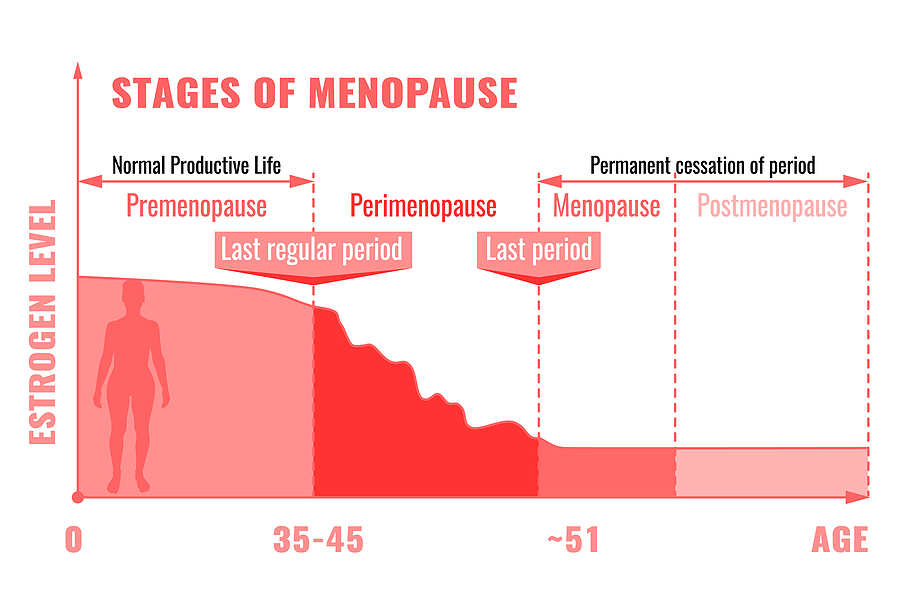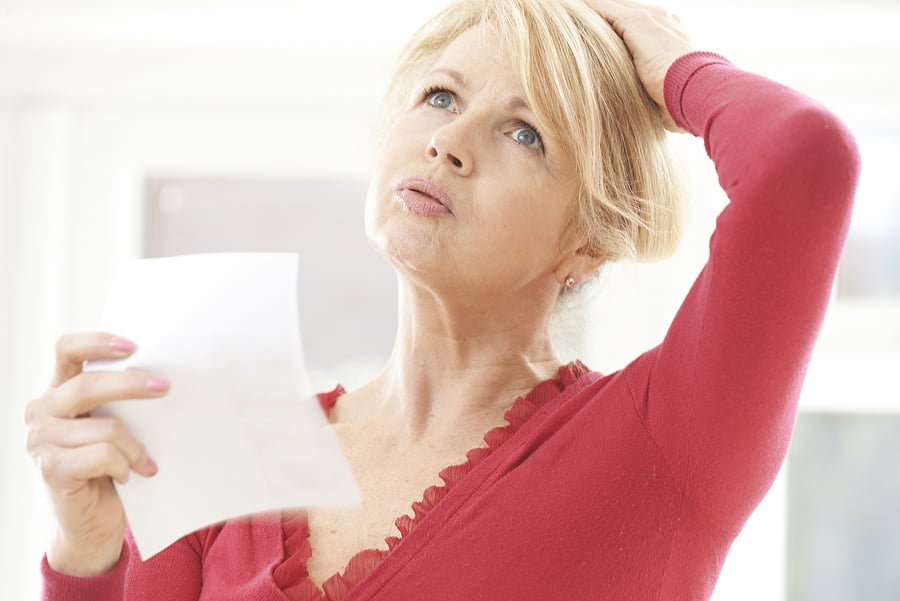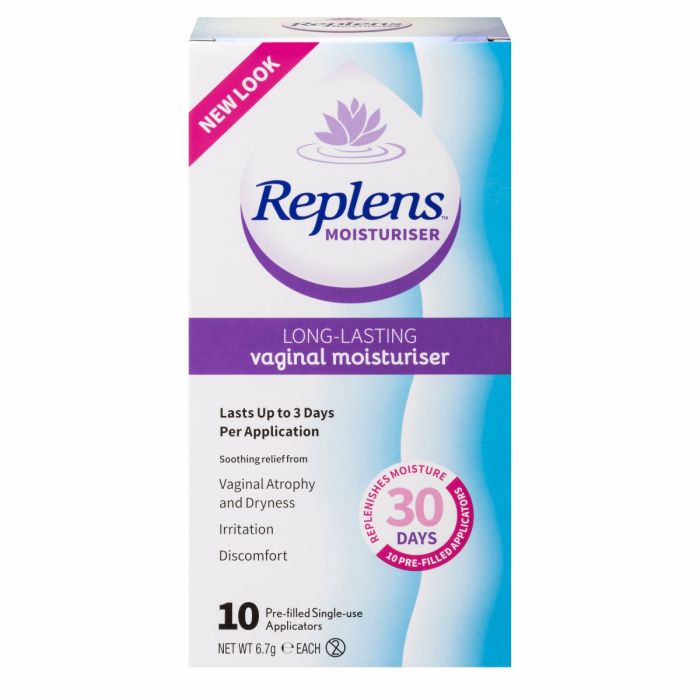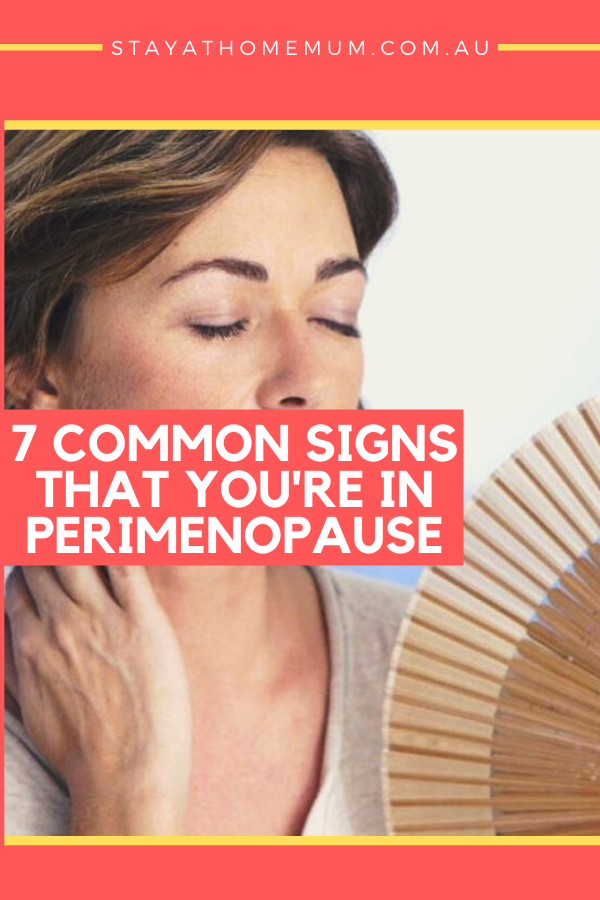7 Common Signs That You’re In Perimenopause
You’re waking up in the middle of the night dripping with sweat.
You’re wearing singlets, in winter while everyone else has jumpers on, and you’re irritable. Really irritable. It could be a passing phase, just something brought on by a winter’s cold and a few late nights. But if it persists, maybe it’s a sign you’re heading toward “the change”.
Perimenopause is the lead-up to menopause. It’s the time when your body is preparing to stop ovulating. Some women barely notice perimenopause, while for others, it seems to have no end. But, while the signs and symptoms are not always pleasant, they can be managed if they’re recognised.
More Reading:
But, I’m too young To Go Into Perimenopause!!
Not necessarily. Perimenopause can last for a year or two, or it can last for ten years. Both extremes and everything in between is normal. So, although the average age of menopause is 51, it’s not unusual for women in their 40s, and even their mid-30s to start experiencing perimenopause symptoms.
Perimenopause or Menopause?
Perimenopause means near menopause. It’s the time when you’re likely to say you’re “menopausal”. During perimenopause, your body begins to produce less of the hormones oestrogen, progesterone, and testosterone, and this is what causes your symptoms.
Eventually, you’ll stop producing an egg every month, and your periods will stop. When you’ve been free of periods for 12 months, you’ve hit menopause.
More Reading: 25 Signs You Might Be Going Into Menopause

What are the signs of Perimenopause?
There are up to 35 symptoms of perimenopause, so it’s not surprising that women sometimes miss the signs. A few of the most common are:
1. Changes in your Periods
Your periods may get longer or shorter, you might bleed more or less, and they might come more or less frequently. If that’s not confusing enough, your periods might also vary from one month to the next. A change of any sort in the usual pattern of your periods is often the first sign of perimenopause.
What can help?
Start tracking your cycle to see the pattern. There is some fabulous period tracking apps out there!
2. You feel more Emotional than usual
We all recognise the stereotypical menopausal woman, crying one minute and throwing plates the next. Being cranky, moody, irritable, and irrational is a sign of perimenopause and is caused by a hormonal imbalance. This hormonal imbalance occurs because your ovaries start to produce fewer hormones, and it takes a little while for your body to respond. Meanwhile, you’re left an emotional mess.
Women approaching menopause are far more likely to develop depression or mood disorders caused by the change in hormones.
What can help?
If you feel that just being emotional is developing into depression, see your doctor. Depression is highly treatable now and there are multiple methods of treating this condition including therapy or medication.
3. You Have Problems Sleeping
Waking up throughout the night, tossing and turning, and insomnia are all signs of perimenopause. In fact, 40% of women complain of sleeping issues when approaching menopause.
What Can Help?
Ensure you empty your bladder before bed and have a good ‘Sleep Hygiene’ regime. That includes leaving the television out of the bedroom, going to sleep at the same time every night and ensuring you wind down before bed.
Some women say that a weighted blanket helps with tossing and turning.
4. Hot Flashes and Night Sweats
You feel your body temperature suddenly start to rise, your cheeks are flushed, you’re stripping off your coat and looking for a fan. You might start to sweat and then, as you cool down you find yourself shivering. A hot flash is your body’s response to a drop in the hormone oestrogen.
Hot flashes come on suddenly and can last from one to five minutes. Some women say that they feel just ‘A little bit flushed’ – as other women say that ‘They feel like they are on fire’.
Night sweats are where you wake up during the night and you are dripping with sweat.
What Can Help?
Sleep with the fan on or air-conditioning at night time. Also, look at Bamboo Sheets or Linen Sheets for your bed – they breathe and are nice and cool on the skin.
More Reading: How Sleeping with a Weighted Blanket Made Me a Better Mum
5. You’ve Lost Interest in Sex
Loss of libido is a common symptom of perimenopause and can result from many things including hormonal changes, sleep disruption and moodiness. Plus if you read ahead, sex can be painful due to vaginal dryness.
What can Help?
Talk to your partner about how you are feeling. Ensure you mention this at your next Doctors appointment so they can rule out any other issue that can be interfering with your libido. Always use a good quality lubricant when you masturbate or decide to have sex.
6. Vaginal Dryness
Giving a whole new meaning to the Kings of Leon song “Your sex is on fire”. Vaginal dryness can cause itchiness, burning, stinging and be downright uncomfortable. The dryness is caused by a drop in estrogen levels. This drop-in estrogen thins the vaginal tissues which then can get irritated. Vaginal Dryness can make sex painful and can even lead to a urinary tract infection.
It is thought that up to 50% of women experience vaginal dryness during Perimenopause.
What can Help?
A quick solution is to use a good water-based lubricant if you plan on getting down and dirty in the sheets. There are also vaginal moisturisers available that can really help. If the problem is persistent, your GP might recommend some estrogen-based therapy which can come in the form of a tablet or cream.
7. You Gain a Few Kilograms
Hormonal fluctuations, loss of muscle density (which is normal as we age), and a slowing metabolism can combine to tip the scales in the wrong direction.
What can help?
With age comes the slowing of your metabolism – and unfortunately it takes more work to shift those unwanted kilograms. Start prioritising daily exercise and really watch those sweet treats that we tend to crave as we get older!
More Reading: List of the Best Weight Loss Shake Options in Australia
The Upside of Perimenopause
For a woman, there’s a lot going on during perimenopause and menopause. You might be suffering symptoms like hot flushes, which make you sweat profusely, you might feel your emotions are out of control, or you might find your jeans are a little tight around your waist. When you look in the mirror, you might no longer see the young, vibrant woman you once were. You might mourn the end of your fertility.
But, there is an undeniable upside. No more periods. Ever.
That means no more tampons, no more period pain, no more bloody mess. You’re free to have sex, go swimming, and stick your bum high up in the air in downward dog.
Not to mention, there’s also no chance you’ll fall pregnant. You will never need to worry about contraception again.
Managing the Symptoms of Perimenopause
There’s no one size fits all solution to coping with the more unpleasant side effects of perimenopause because every woman experiences it differently.
For some, a healthy diet and exercise are enough to manage their symptoms. But, for others, their symptoms make life unbearable. If this is you, consider making a trip to your doctor.
Your doctor can discuss ways to manage individual symptoms, or if your symptoms are particularly bad, can let you know about the risks and benefits of Hormone Replacement Therapy (HRT).
No matter what your symptoms are, it’s important to remember that perimenopause is a natural, and normal transition for a woman. It’s not something that is in your control.





